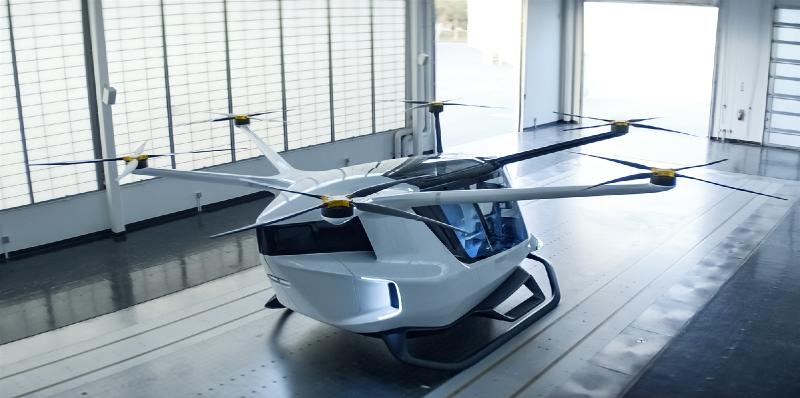Electric air taxis powered by hydrogen promise greater range for intercity commutes



Your daily commute may be about to take to the skies.
More than 100 electric air taxi designs are already in the works for short hops in cities, including the Airbus Vahana , the German Volocopter , and Uber’s Elevate project . But now, a new design aims to rise above the others with its use of hydrogen fuel cells instead of batteries to power longer flights that can carry more weight.
Hopkinton, Massachusetts-based Alaka’i Technologies says hydrogen fuel cells will give its six-rotor Scai air taxi greater range and lifting power than competitors using batteries, which could open up new opportunities to fly people and other payloads.
The company recently unveiled a mockup of the Scai air taxi in Los Angeles , and says it will soon start tests on a flying prototype.
The new vehicle could be in production in the United States by 2021, although it will need approval from the Federal Aviation Administration.
Alaka’i president Brian Morrison said the Scai could fly five people or 1,000 pounds of cargo up to 400 miles — between two and four hours of flight, depending on the size of the aircraft’s fuel tank.
Most battery-powered air taxi designs only have enough power to carry two passengers for around 15 minutes before needing to be recharged. “So we can carry two and a half times as much payload, and carry it for eight times as long,” Morrison told NBC News MACH.
The greater range and power means the Scai could fly between nearby cities, instead of just on short trips within a city, and could take on air ambulance work , freight deliveries or disaster relief tasks, he said.
Initially the Scai will need a qualified helicopter pilot to fly passengers, but the company is working with the FAA to allow autonomous passenger flights without a pilot , Morrison said.
Fuel cells use chemical reactions between stored hydrogen and oxygen from the air to create electricity and pure water. And because hydrogen can also be made cleanly from electricity and water, hydrogen fuel cells can be an effective alternative to batteries for storing electricity.
Batteries are currently favored for electric cars, but hydrogen fuel cells are increasingly being used for large electric vehicles such as trucks, buses and trains, where electricity from hydrogen fuel can be more economical than batteries.
For smaller vehicles, batteries can be a cheaper option but hydrogen fuel cells can be made smaller and lighter than existing batteries — critical for keeping the weight of electric aircraft down.
Richard Anderson, a professor of aerospace engineering at Embry-Riddle Aeronautical University in Daytona Beach, Florida, said hydrogen fuel cells could provide greater flying power than batteries alone, but they are still not as powerful as regular aircraft engines running on fossil fuels.
He also cautioned that flammable hydrogen fuel would need careful handling on aircraft to ensure it doesn’t explode. “I sort of wonder what that hydrogen tank looks like, and how big is it?”
Anderson thinks it will take more than two years to get FAA approval for the Scai, while regulations to allow flights without a pilot might take more than five years.
“The technology for fully autonomous [flight] exists right now,” he said. “But can you do it at the safety level that the public expects? That is probably five or 10 years down the road.”



Do you see this as the wave of the future or just sci fi?
I wave
ed, good by to our
future's past
time, cause, I wave, even while
surfing, various waves in macro
micro ovens ,
baking beans, while making electricity,
replace gas...
.
It will Never B approved that quickly, in my oh
so
humble opine
igknorantzrulz....it's good to see you here again. You have been missed.
well,
U must work on your aim
Which one?
Nice to see ya Iggy..
N
U as well Frosty.
Come to thi9nk of it, i need a FROSTY ONE or Twenty right now, B back
Dear Friend Perrie: Where are they on traffic congestion in the sky?
How do they keep accidents from happening?
Things to consider.
P&AB.
Enoch (Up Up and Away In My Beautiful Balloon).
Check out the vehicles flying around in this video clip. I think I'd rather stay on the ground.
I think it would likely not become an every day thing for regular family use, as hydrogen is very volatile and would require very careful handling. And I don't think there would be a hydrogen station on every corner like gas stations tend to be at times. Plus, the expense would likely be much more than for gasoline or electric cars.
JMOO
Hydrogen can even be burned in today's internal combustion engines.
The hydrogen molecules can be attached to metal halides (stabilized) and be released into your car's carburetor when the halide tank is heated. So your current gasoline engine runs the car until the hydrogen halide tank (which is situated on your engine block) releases enough hydrogen to run the car. The system switches over from gasoline to hydrogen automatically. This system doesn't rely on a pressurized hydrogen supply so it's much safer.
Conversion kits used to be available but I would not be surprised to find out that they're no longer available. The fossil fuel companies have been very successful in blocking innovations that threaten their stranglehold on automobiles.
Thanks for the information on this system, Al. It sounds like a much safer system. How does it compare money wise with gasoline?
They seem to be a little behind the times. The flying broom has been available for centuries.
Thank you for posting a picture of my Super Dooper Varoom Broom Kavika. Comes in handy here with all the freeway bumper to bumper freeway traffic. And I can out run all the other gals in my Coven on Halloween night.
It's an interesting idea. My concern would be controlling the air traffic. If it's to be used as a literal taxi, in the air, the number of people needed to make sure all of these things flying around a large city would make them not cost effective.
The answer could be a computer controlled GPS system to ensure these things aren't slamming into each other. Interesting idea for sure, but not sure I would want them flying over my head without some kind of assurance that they aren't going to land on my head.
Things hitting each other in the air and falling down on people below would be a major concern, so to aid in eliminating that potential injury threat maybe we should build underground tubes and tunnels with high speed transportation devices.
Sounds a little Sub-Par, the way i read it.
We already have those....it's called a subway.